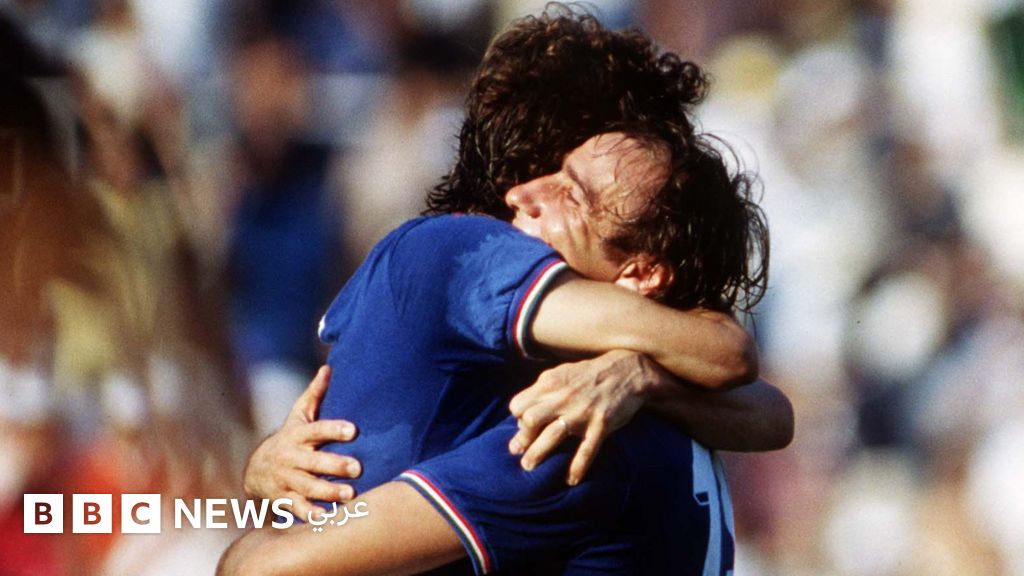- Fernando Duarte
- BBC Sports
The draw would have put Brazil in the semi-finals against Poland
In November 2004, Brazilian football legend Socrates gave a famous (and brief) performance for Garforth Town in England, and as a football correspondent for a major Brazilian newspaper, I traveled to West Yorkshire to write about the event.
An interview with the legendary midfielder, known as the Doctor for his medical degree and political activities, devolved into a long after-hours conversation in a local pub. I chatted with Socrates, who had always been a relaxed, football personality with forthright candor.
In that tavern, Socrates made a startling confession: “I’ve never seen Brazil’s 3-2 defeat by Italy at the 1982 World Cup, I don’t need to play that match again.” That rejection probably lasted until January 2011, when he died at the age of 57.
“That match” was a classic World Cup match that took place on a hot Barcelona afternoon 40 years ago. One of Brazil’s most iconic generations of footballers had their dreams shattered by an Italian side that got off to a shaky start before defeating West Germany in the final.
As time went on, many of the older Brazilian fans disappeared, but on July 5, 1982, it was deemed that a crime against football had been committed.
Brazil in 1982 was still under the rule of the military regime that had taken power 18 years earlier, when left-wing President João Goulart was overthrown in a military coup.
When Joao Figueiredo, an army general, became president in 1979, he began working towards a return to democratic rule, but there were growing calls for a more expeditious handover of power in light of the country’s economic turmoil.
At that time, Tele Santana was appointed as the new director of football in Brazil in the early 1980s. Santana was an excellent winger who scored 164 goals in 9 years with Rio de Janeiro Fluminense, and is still ranked fourth in the list of the best goalscorers for that team.
Santana was also known for his fair play as he was never sent off in his 12 year career, he demanded the same of his players.
Brazil started their 1982 World Cup qualifiers in Spain with unconvincing 1-0 and 2-1 away victories over Venezuela and Bolivia, but Brazil soon had impressive results in their home games, beating the same opponents 5-0 3-1. On a European tour in May 1981, Brazil’s players raised eyebrows by defeating England, France and Germany in a matter of days.
But Brazil did more than win, they played a fluid game that couldn’t be more different from the tactical discipline that so infuriated fans in the post-Pele era.
The feats of Pele and Brazil at the 1970 World Cup seemed like a long-forgotten dream during uninspired campaigns in the next two tournaments, despite the team finishing in the top 4 on both occasions.
Now, in addition to Socrates, the Seleção also includes Zico, the imaginative playmaker of Flamengo. And that team knew that any player didn’t touch the ball more than twice before passing it. Zico described it by saying, “It was a pleasure to watch the team play, and it was even more fun to be in the game.”
“We were firmly convinced that Brazil should maintain the style for which they are famous – he says – It would be wrong from the outset to be afraid of losing or being held hostage by the result.”
“We wanted to enjoy what we were doing, we felt like something really special was happening,” he added.
So did millions of Brazilians. Banners were flying in the streets as if there were preparations for a royal wedding or coronation. And at a time when Brazilian players mostly played at local level, Falcao was a rare exception, playing for Italian club Roma. And it wasn’t surprising that he bumped into an international star during a supermarket shopping spree in Rio.
“The fans insisted we listen to their opinions, but at least they identified with us because we were all playing in Brazil at the time,” Zico says.
“These days, after playing for the Brazil national team, players often get on a plane and fly abroad almost immediately,” he said.
Socrates was 50 when he came out of retirement to play for Garforth Town
Expectations for the squad were understandably high, and in Spain Brazil opened the season with a thrilling 2-1 win over the Soviet Union before beating Scotland 4-1 and New Zealand 4-0.
The tournament started with 24 teams in 6 groups, each group consisting of 4 teams. The 6 group winners and runners-up qualified for the second group stage. The four winners of these groups will advance to the semi-finals.
Brazil found themselves in the company of regional rivals Argentina and Italy, who drew all three of their first round matches, and barely qualified from the group which included Poland, Cameroon and Peru.
Italy’s preparation for the tournament was determined by the situation of forward Paolo Rossi. In 1980, Rossi was embroiled in a match-fixing scandal and ended up getting a two-year ban, which ended just 8 weeks before the World Cup. However, coach Enzo Bearzot has included the Juventus striker in his squad.
Media coverage and the attitude of the fans created a gloomy atmosphere as Italy’s players lined up against Argentina on 29 June and ninety minutes later they won their first game in Spain. And when Argentina were defeated by Brazil 3-1, the stage was set for a decisive clash between two completely different styles of play.
Marco Tardelli’s iconic celebration of Italy’s victory over West Germany in the 1982 final
“You’re playing there, is there anything you want to say?”
Santana asked this question at the end of a team talk in Barcelona. Falcao was already worried about the winner-takes-all match against Italy at the now vacated Espanyol stadium.
The Roma midfielder will face illustrious opponents, and feared his fellow Brazilians may have misunderstood the real danger posed by the Italian squad’s players due to their stuttering start.
Pressed by the coach, Falcao expressed perplexity about the possible role of Italian left-back Antonio Cabrini, a talented player who is very useful in attack. Defender Claudio Gentile risks sticking to Zico like glue, aiming to repeat what he achieved against Diego Maradona in the previous match.
The Italian style of play was very different from the attacking style of Brazil. They know how to close and counter their opponents, the victory against Argentina proved it, a victory that reinvigorated them, but they also needed to activate the front line to beat the Brazilians. Their main striker, Rossi, had yet to score in that tournament.
“That Brazilian team was not from this planet,” Rossi told me in 2006. “They had players who could pass the ball blindfolded, and for me it felt like learning to play again after the suspension.”
In the Brazilian field, the mood couldn’t be more different.
“Some players teased me, saying it was very easy to make a living in Serie A,” says Falcao.
Defender Oskar then recalled that some of the players were already discussing the strengths and weaknesses of Poland, their expected semi-final opponents.
Brazil will qualify with a draw, because they have a better goal difference, but Zico recalls: “In the locker room before the match, Tele (Santana) never asked us to back down, our commitment was always to aim for victory, that was the real Brazilian way.”
Brazil won the 1994 World Cup after defeating Italy on penalties in the final
Much of the crowd in Barcelona had not yet found a seat when Cabrini’s cross was headed in by Rossi. Thus, it wasn’t 5 minutes into the match until Italy went on to lead 1-0 and Rossi broke the jinx.
Brazil responded shortly after through Socrates, but fell behind again in the 25th minute when Rossi took advantage of a mistake on the Brazilian defensive line to snatch the ball and convert it on goal. And when they equalized again in the 68th minute, Falcao not only screamed with delight, but also felt choked by the gum he was chewing.
With a 2-2 draw, Brazil get the result they need to qualify for the semi-finals. But with just over a quarter of an hour to go, and from an Italian corner kick, Rossi scored his third goal (a hat-trick), turning the tide of the match. Then Israeli referee Abraham Klein mistakenly disallowed another Italian goal for offside, before calling what in Brazil will forever be called the ‘tragedy of Saria’.
The impact of that “tragedy” could be seen in the realistic styles of play that would become more popular in the country over the next generation, and when Brazil beat Italy on penalties in the 1994 World Cup, no one could tell to have played with the same bravado.
Meanwhile, Italy continued their victories by beating Poland in the semi-final with two goals for Rossi before winning his third world title by defeating West Germany in Madrid. The previously disgraced striker, who also died in 2020 at the age 64, scored in the final (3 -1) He was awarded the Golden Boot.
“We were very disappointed with the result against Italy, but everyone had a clear conscience,” recalled Zico.
Falcao, who published a memoir of the 1982 campaign on the 20th anniversary of the match, looks boldly to the past.
“This team lost that game but earned their place in history,” he said. “I am grateful to have been involved in one of the greatest World Cup matches.”
But some team members felt more deeply defeated, like Socrates.
Twenty-two years later Barcelona, on a cold West Yorkshire night, were still struggling to come to terms with the events of that match.
“We had a great team and we played cheerfully – he said, barely taking his eyes off the trophy in his hand -. Then it was Rossi who made 3 touches and scored a hat-trick. Football as we know it died that day. “


